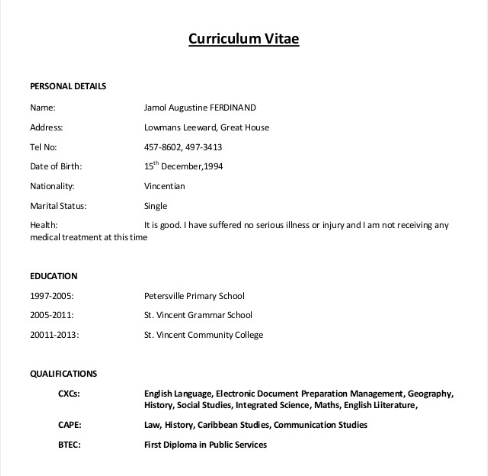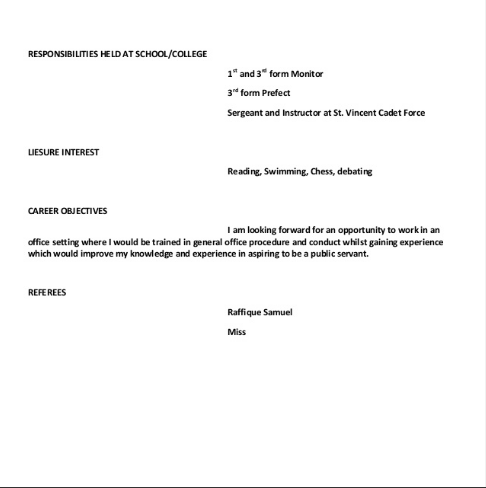What is Curriculum Vitae?
Curriculum Vitae is a form describing your education, your identity, your social life and your hobbies to the employer or institution. It has an important role in your applications. Company or Human Resources Specialist doesn’t know you but under favor of this document, they have a right to know you. It isn’t your life story so you have some points that you have to describe in your curriculum vitae. They are your experiences, your education life, your social life and your skills. It shouldn’t be more than 1 page. It is also your advertisement. We watch lots of advertisements on TV every day. We don’t take care of some of them. But some takes our attention. It is like our advertisement. Better you prepare it, more you have chance to be returned. Also you can think it as a guideboard on your way. You should prepare so well and clearly that it should take the employer’s or Human Resources Department’s attention. Curriculum vitae is so important for you. But it isn’t same with resume. You can look at our writing about differences between resume and CV.

What to Include Curriculum Vitae?
In your curriculum vitae, you should advertise yourself. You should use active verbs, not passive. You should take care of your description, page organization. And to be clear is quietly important. Your curriculum vitae should identify you. It should be special for you.
- Personal Information and Contact Information: Firstly you should start to prepare your CV with your name, surname and contact information. You shouldn’t describe your family, just you!
- Educational Information and Qualifications: In this part, you should write the institutions which you studied with dates. You should specify your degrees, like masters, undergraduate, etc…
- Work experience/employment history: ın this part of your CV, you have to write your working life until today. You can mention about your internship term. You can use chronological curriculum vitae. This type is the most used one. In this type, you write firstly your most recent appointment in your CV. Then you write your other work experiences.
- Skills: You can mention about your physical skills like sports etc… Besides that you can mention about your foreign languages, computer program skills.
- Training / Education Abroad
- Thesis
- Publications
- Teaching Experience
- Researching Experience
- Presentations, Lectures, Exhibitions
- Awards and Honors
- Professional Licenses
- Certifications
- Membership
What Not to Include
On a CV, your references, your educational background, your experiences are the most important ones. But you don’t need to put your photo or you don’t need to mention about your salary history. And also you don’t need to give your references. If your employer demands it, you give them on time.
Every job application doesn’t want same things in your CV. Some of them want to learn your marital status; some of them want to learn your social life. It changes according to the companies.
How Long Should a Cv Be?
As I said in the beginner of the article, CV isn’t your life story. So you don’t need to write everything about you. It should be one or two pages. It isn’t prepared in detail. If it is prepared in detail, it becomes resuming.
Curriculum Vitae Sample
The following CV is about an applicant who wants s to work in a well company and improve her. It has the applicant’s personal information, then educational information, qualifications, successes and career objectives. It is just for 2 pages and it is quietly clear and short.


More Curriculum Vitae Examples and Templates
In this part, you can find so many CV examples which can help you prepare your own CV. You can click on them and reach whichever you want. .
- CV Format
- CV Template
- Free Microsoft CV Templates for Word
- Academic CV
- Euro pass
- Information Technology CV
- International Theater CV
- International CV with a Profile
- Medical CV
- United Kingdom CV
Curriculum Vitae Writing Tips
Make Many Formats of Your CV
You don’t need to use just one CV. You should prepare a new one for every application.
Keep it short
You should write a short and clear CV. It should include just your education, experience, background and employment.
Tell the truth
You shouldn’t write unreal things on your CV. Because they will confront you today or tomorrow. You should write about your school background, work experiences, expectations from work.
Generally Human Resources Department checks your references and if they aren’t correct references, they will catch your lie.
Check the Format
You should search curriculum vitae formats. It should have been sure that your CV is suitable for job applications or not. You can surf on web in this subject.
How to Write Curriculum Vitae?
If you don’t know how to write your CV, you can click on our article.
Curriculum Vitae Cover Letters
As you know, a curriculum vitae should certainly have a cover letter. It is like CV’s advertisement. If you don’t know how to write your cover letter, you can reach our cover letter samples.





